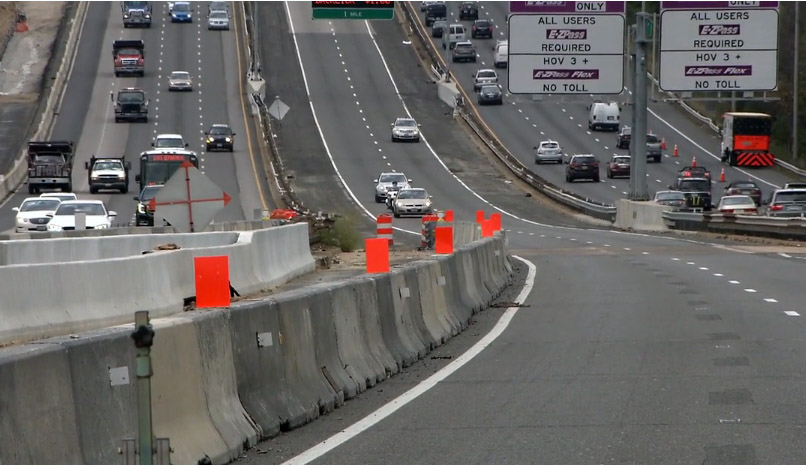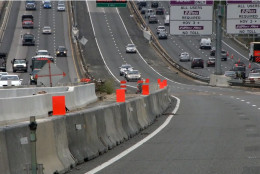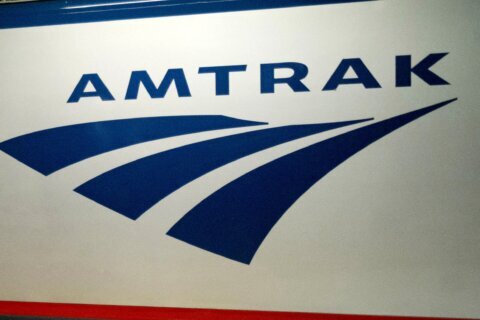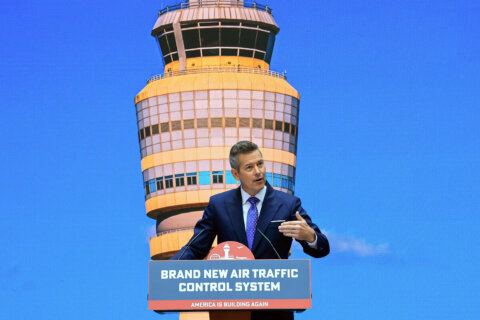This car on the screen automated mode. You can see it change lanes with the drivers hands off wheel. #WTOP pic.twitter.com/i51Ld4UbFs
— Mike Murillo (@MikeMurilloWTOP) October 19, 2015Automated vehicle with @MarkWarner inside moves over for VSP police car. #WTOP pic.twitter.com/kBgrXSS94E
— Mike Murillo (@MikeMurilloWTOP) October 19, 2015A look at one of the automated cars. Others used were connected cars which warn drivers of hazards. #WTOP pic.twitter.com/h5pR2L69ni
— Mike Murillo (@MikeMurilloWTOP) October 19, 2015What controls the automated vehicle. @VTTINEWS #WTOP pic.twitter.com/dnW3CR78ni
— Mike Murillo (@MikeMurilloWTOP) October 19, 2015A look at the cars getting ready for the demo on 395 in Virginia. #WTOP @VTTINEWS pic.twitter.com/h0TjY2efUV
— Mike Murillo (@MikeMurilloWTOP) October 19, 2015

ALONG THE 95 EXPRESS LANES — At speeds in excess of 50 miles per hour, the driver of a Cadillac SUV takes his hands off the steering wheel and his feet off the pedals while traveling along Interstate 395 in Northern Virginia. At the same time, a Virginia State Police car comes up from behind, lights flashing. Without the help of the driver, the vehicle slows down and changes lanes to let the officer pass.
The car is one of two automated vehicles designed by Virginia Tech’s Transportation Institute that were tested in the 95 Express Lanes Monday, marking the first time automated cars were used on an interstate in the commonwealth.
“I think it’s very cool,” said U.S. Sen. Mark Warner, of Virginia, who took a test ride in one of the SUVs.
Warner said the cars offer a glimpse of the future. And he expects the automated vehicles to catch on, as wireless technology did in the past.
The two cars, which allow driverless operation, were joined in the test run by several other vehicles equipped with so called “connected” technology. Unlike the automated vehicles, connected cars require drivers to be in control at all times, but the vehicles warn drivers of many hazards and are capable of automatically taking some corrective actions.
“It has been amazing to be able to develop technologies that not only are able to help us with traffic, with fuel emission, but also safety,” said Myra Blanco with Virginia Tech’s Transportation Institute.
The cars received messages from sensors along the road, in other vehicles and even in the vests of construction workers, who were staged along the road for the test. The express lanes, which were closed for the midday direction switch, were cleared of all other traffic giving the testers a straight shot from Arlington County to south of the Capital Beltway in Fairfax County.
One of the tests involved a connected motorcycle, which abruptly stopping in the road. When the biker hit the brakes, a message was relayed to the vehicles behind it, causing those vehicles to automatically warn the drivers and apply the brakes.
The goal is to develop autonomous vehicles, which would allow a driver to catch some shut eye during the drive. But that technology is still a long way down the road. The vehicles used in the test require a driver to take over if the car approaches an event it can’t interpret, such as a crash scene.
“There are circumstances that they just won’t be able to recognize and the driver will have to take over,” said Tom Dingus, directors of the Transportation Institute.
Several obstacles were set up for both the automated and the connected vehicles, and riders got to experience the reaction of the cars to different hazards.
There are different levels of automated vehicles, the two tested on the roads of Northern Virginia are level 3 vehicles, which allow the driver at times to take their hands, feet and even eyes off the road.
Manufacturers are already working on developing the technology, with Tesla announcing that it will produce a car with level 2 automation in 2017. Level two automation vehicles can drive themselves, but drivers will need to keep their eyes on the road at all times.
This test run will be the first of many as Virginia has allowed 70 miles of highway in the state to be used as a testing grounds for such vehicles. The roads when used are cleared of traffic, so commuters and other motorists are not at risk.
Sen. Warner said some of the lane changes with automated vehicle could be smoother, but he said he enjoyed the ride.
“If it’s compared to my driving skills or driving with the automated, I’d take the automated any day,” Warner said.
Virginia Tech Transportation Institute, partners test automated, connected vehicles on interstate – Virginia Tech from VirginiaTech on Vimeo.








